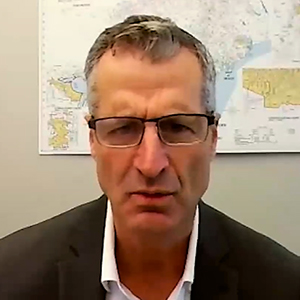February’s winter storm, which threw much of the Midwest into a deep freeze and almost created a disaster of epic proportions in Texas, remained a hot topic last week during a pair of industry conferences.
During the Edison Electric Institute’s Road to Net Zero conference, SPP CEO Barbara Sugg discussed lessons learned from “The Big February Freeze” as part of a panel that also included MISO CEO John Bear.
Sugg said SPP staff learned “a ton” from the event, which required them to shed load for the first time in the RTO’s 80-year history. Staff took the normal steps to alert members and stakeholders as to what was coming, but fuel supply issues knocked out more than half of its accredited natural gas resources and a third of its accredited coal resources, she said.
“What we learned from the beginning of the event was monumental,” Sugg said. “We weren’t as good coming into the event as we thought we were. We definitely identified some gaps.”
SPP is conducting a review of its performance during the storm involving members, its Market Monitoring Unit and state regulators. Still, the grid operator has been caught off-guard by the political attention it has received in its 14-state region.
“They all want to have a say in what we do,” Sugg said.
No surprise, but load shed and customer outages have drawn much of the state politicians’ focus.
“We could improve the coordination with how we manage load-shed events,” Sugg said. “SPP has typically not been involved with how that’s managed. There were some challenges at the [transmission owner] level that exacerbated the problem along the way that are worth a look as to whether SPP should have a role in that.”
On Monday, SPP’s Regional State Committee, composed of regulators from its Eastern Interconnection states, met to review its portion of the work. The regulators agreed resource diversity will be a critical part of any solution, but debated who has the responsibility for directing utilities on what their fuel mix should be.
“Someone has to be responsible here,” North Dakota Public Service Commissioner Randy Christmann said.
Noting he spent 25 years in politics fighting for states’ rights, he said, “Between what the states have allowed in the last decades and the utility companies’ decision to join RTOs, a lot of the responsibility has been passed on to us.”
ERCOT’s Jones Looks to Future
Brad Jones, ERCOT’s interim CEO, made a rare public appearance during American Clean Power Association’s CLEANPOWER 2021 virtual summit on Wednesday. He took a glass-half-full approach to the Texas grid’s recovery from what he called a “rather severe winter storm.”

“It’s given us an opportunity to look at ways we can improve ERCOT and the ERCOT market,” Jones said during a keynote address. “My overall goal in my time here at ERCOT is to make sure we do things for not only today and not only the next winter story, but for the future of ERCOT.”
That future will rely heavily on renewables. The grid operator already has about 25 GW of nameplate wind capacity and 5 GW of solar capacity on the ground, Jones said, with another 10 GW of solar generation expected over the next few years. Many of those sites are also co-locating batteries, which moves energy “from the low-value time period to the high-value time period,” he said.
“Batteries … provide an opportunity to balance out the variable generation we receive from solar and wind generation,” Jones said. Noting the ERCOT grid’s lack of hydropower as compared to northern states, he said, “We don’t depend on the snows in Oklahoma to keep our system running. We don’t have the luxury of leaning upon hydro for our renewables. … Batteries will fill that gap for us.”
Monitor: Short-term Focus on Finances
Carrie Bivens, ERCOT’s Independent Market Monitor, used her CLEANPOWER keynote address to compliment the grid operator’s control-room staff for their “heroic job” in preventing the Texas grid from falling into a total blackout when surging demand exceeded available supply during the icy weather.

“As bad as things were those few days, it could have been worse,” Bivens said. “I never want to see it happen again. As an industry, let’s work together to make sure that doesn’t happen again. I never thought I’d see that in my lifetime.”
While the Texas legislature has passed a pair of bills designed to address the lack of weatherization and enforcement capabilities, Bivens said much remains to be done. (See Abbott Signs Texas Grid Legislation into Law.)
“This is one of those big events where there are a lot of points of failure to discuss,” she said. “Going forward, we need to work with the final impact of this event … that’s where we’ll be concentrating in June.”
Bivens pointed out that ERCOT’s prices, capped at $9,000/MWh for more than three days, affected all market participants. Whereas some utilities and generators ended up on the positive side of the money flowing to the market, she said, those same entities were on the losing side as well.
“It’s just a matter of how your generators performed and how well you hedged before the storm,” Bivens said. “It’s not so simple to say generation won and load lost. It doesn’t necessarily work that way.”
Still, she is not ready to pitch scarcity pricing overboard, saying it is essential to ERCOT’s energy-only market. The market designers have determined that $9,000/MWh is the grid operator’s value of lost load, although February’s long-term price caps have triggered an automatic reduction to $2,000/MWh for the rest of 2021.
“I can’t stress enough how important pricing is for this energy-only market. Prices should reflect the value of lost load. It’s not just about incentivizing generators to perform that day or that hour or that interval, but to provide long-term incentives for the generation necessary to keep us moving forward,” Bivens said. “One of the things about regulatory certainty, especially in an energy-only market, is stability of the market. It’s important for decisions being made long-term 20 years out.”
Renewable Advocates Survive Texas Legislature
A CLEANPOWER panel of Texas renewable lobbyists agreed they had dodged a bullet during the recent state legislative session when several bills targeting renewables failed to make it to the governor’s desk.
Now comes the hard part, they say: ensuring the rulemakings that come out of the Public Utility Commission don’t inflict further harm on ERCOT’s renewable resources.

“What will be done with the legislation? That falls to the [natural gas regulator] Railroad Commission and the PUC,” Advanced Power Alliance CEO Jeff Clark said. “Clearly, the attack that was made on us … will continue to unfold at the PUC. That is a key effort that we are all going to have to engage in.”
Given the new legislation and governance changes at ERCOT and the PUC, the panel was asked when things will return to normal.
“This uncertainty is our new normal,” said Lynnae Willette, EDF Renewables’ senior manager of regulatory and legislative affairs. “We have so much change up high. We have a new PUC, a new ERCOT CEO, a new ERCOT board, a lot of new legislation to implement and a lot of opposition we’re still facing. It’s important for us as an industry to rally and stay engaged.”
“The most important activity is the rulemaking at the PUC,” Clark said, referring to weatherization and a review of the ancillary services market. “There are specific mandates in the legislation, while not what they were, that will include an examination of the services and make sure they encourage a sufficient amount of fossil fuel. Our opponents smell blood in the water, so they’ll be more active in the next legislature.”




